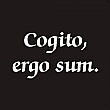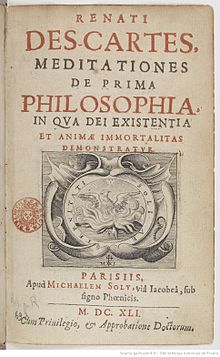

What does "I think, therefore I am" mean?
How can you characterize Descartes’ doubt? What does it mean to say that Descartes’ method is a method of doubt?
Explain: The destruction of all past beliefs compels transformation.
Looking forward: How does Descartes's philosophical method anticipate Richardson's novelistic method? Hint: Descartes was "writing to the moment" before Pamela held the pen.
Why does Descartes use the dream hypothesis and the “evil genius” hypothesis? Do Descartes's use of the dream and Bunyan's use of the dream have anything in common?
Descartes's trashing of the past has some equivalents in the fictions we read. What is the status of the past in The Pilgrim's Progress? Robinson Crusoe? Pamela?
Descartes's Meditator does not for some time have a body. Why is the temporary denial of the body important to his thinking? And what kind of bodies inhabit (or are imagined in) The Pilgrim's Progress? Robinson Crusoe? Pamela?
Why do you trust your senses? What do you trust your sense for? What kind of world would you live in if you did not trust your senses?
What is the difference between trusting your senses in a pratical sense and trusting them in a philosophical sense?
Does the trustworthiness of the senses emerge as an important issue in the fictions we read?
Have you doubted your senses? Did you learn anything by doubting them?
Can you see any problem with Decartes's underlying assumptions?
What questions could you contribute?
